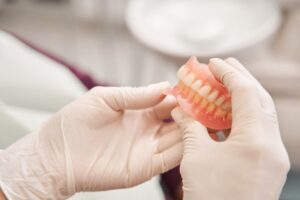
Dentures are meant to restore your smile, improve your ability to eat and speak, and boost your confidence. However, if they don’t fit properly, they can cause more harm than good. Ill-fitting dentures can result from changes in your jawbone over time, worn-out materials, or dentures that were never properly adjusted in the first place. Here are 5 common complications you might face if your dentures aren’t fitting as they should.
1. Mouth Sores and Irritation
When dentures rub against your gums or the inside of your cheeks, the constant friction can create painful sores. These areas can become tender, swollen, and even infected if bacteria get in. In severe cases, open sores can make it too painful to wear dentures at all, forcing you to go without them and affecting your ability to eat and speak.
2. Difficulty Eating and Speaking
A secure fit is essential for proper chewing and clear speech. Ill-fitting dentures can shift or slip out of place while you eat, making it hard to bite and chew certain foods. You may find yourself avoiding tougher or chewier options, which can limit your nutrition. Speech can also be affected, leading to slurring or whistling sounds when you talk, which can be frustrating and embarrassing.
3. Bone Loss in the Jaw
One of the lesser-known problems of ill-fitting dentures is their potential to speed up bone loss. When dentures don’t rest evenly on your gums, certain areas of the jawbone experience uneven pressure. Over time, this can cause the bone to shrink more quickly, worsening the fit of your dentures and making it harder to keep them in place without adhesives.
4. Gum Infections and Inflammation
Loose dentures create gaps where food particles and bacteria can get trapped. Without proper cleaning and a secure fit, this can lead to gum inflammation, known as denture stomatitis. Symptoms include redness, swelling, and tenderness of the gums. Infections can also develop, which might require prescription medication to treat and could delay your ability to wear your dentures comfortably.
5. Headaches and Jaw Pain
An improper bite caused by ill-fitting dentures can put extra strain on your jaw muscles and joints. This tension can lead to headaches, facial discomfort, and even temporomandibular joint (TMJ) problems. The pain might start subtly but can worsen over time, impacting your daily comfort and overall quality of life.
When to See Your Dentist
If your dentures are causing you pain, slipping frequently, or making it hard to eat, it’s important to see your dentist right away. They can adjust, reline, or replace your dentures to restore a comfortable fit. Waiting too long can make the problem worse, as continued irritation and bone changes can make future adjustments more difficult.
Dentures should feel comfortable, stable, and natural. If they don’t, you may be dealing with complications that can affect your oral and overall health. Regular dental visits, proper care, and timely adjustments are key to preventing these problems and keeping your smile in top shape.
About the Author
Dr. Hiren Patel is a 2011 graduate of the University of Colorado School of Dental Medicine. Since then, he has completed over 500 hours of continuing education, including extensive hands-on training in dental implant surgeries. He also attended a preceptorship through the University of Texas at San Antonio. Today, he maintains several professional memberships, including ones in the American Dental Association, the Texas Dental Association, and the Academy of General Dentistry. If you’re looking to restore your look and functionality with dentures, schedule an appointment through our website or call our San Antonio office at (210) 590-2736.
